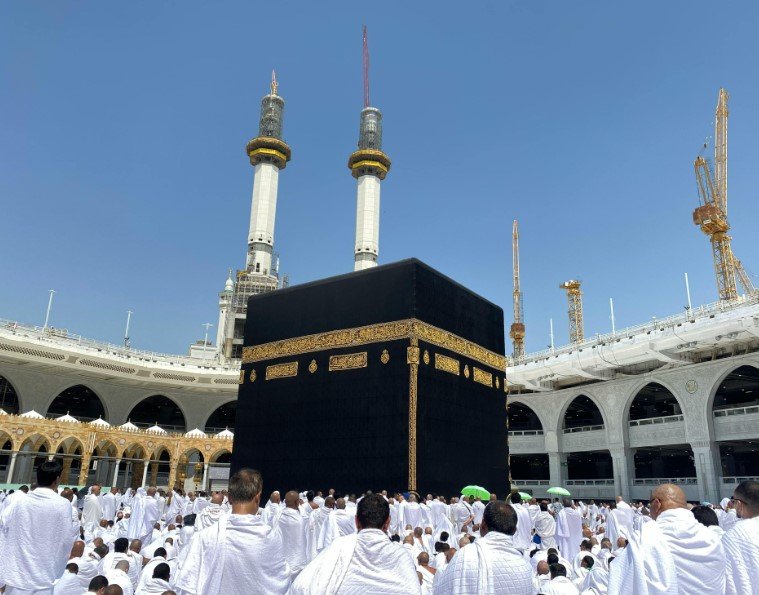Fear spread fast. But the Nigerian government says there’s no ban on its citizens going for Hajj. The confusion? All thanks to a widely shared Saudi visa notice — and social media hysteria didn’t help.
The announcement may have sounded like a travel shutdown, but officials insist it’s not what it looks like.
A Temporary Visa Freeze, Not a Pilgrimage Ban
The Saudi government recently announced a suspension of short-term visas for nationals of 14 countries — Nigeria included. That suspension takes effect April 13, 2025, and stays in place until the end of June.
Almost instantly, speculation went wild. Headlines claimed Nigerian pilgrims had been banned from Hajj. Twitter timelines flared up. WhatsApp groups were in full-blown crisis mode.
But Nigeria’s Federal Government stepped in, firmly rejecting the rumors. “No Nigerian pilgrim will be denied access to perform the 2025 Hajj,” they said.
The visa categories affected by the suspension are:
-
Business (single and multiple entry)
-
Tourist e-visas
-
Family visit visas
These do not include official Hajj visas, which are issued through a completely different process.

What’s Really Happening?
Let’s break this down.
Saudi Arabia is tightening short-term visa entry rules from April 13 to reduce the misuse of non-pilgrimage visas during the Hajj season.
The reason? Last year’s Hajj was a logistical nightmare.
-
1,301 pilgrims died in 2024.
-
The majority of those who died had no official Hajj permit.
-
Most fatalities were linked to extreme heat and lack of proper accommodation.
That’s what Saudi officials are trying to prevent this time. Their goal: limit crowding and avoid another tragic season.
One-sentence paragraph: The new rules aren’t about banning countries — they’re about better control.
The Countries Affected — And What They Need To Know
Here’s the full list of the 14 nations hit by the short-term visa suspension:
-
Nigeria
-
Egypt
-
Morocco
-
Algeria
-
Sudan
-
Ethiopia
-
India
-
Tunisia
-
Yemen
-
Jordan
-
Iraq
-
Indonesia
-
Pakistan
-
Bangladesh
People with valid visas from these countries must enter Saudi Arabia before April 13 and leave by April 29.
Anyone who overstays risks a five-year entry ban — that’s serious.
This is how the timeline looks:
| Event | Date |
|---|---|
| Visa Suspension Begins | April 13, 2025 |
| Final Exit Date for Short-Term Visas | April 29, 2025 |
| Policy Remains in Place Until | End of June 2025 (Post-Hajj) |
Hajj Visas Follow a Different Route
Pilgrims don’t use tourist or business visas to attend Hajj. There’s a formal quota system and a process that works exclusively through national Hajj authorities.
In Nigeria, that’s the National Hajj Commission of Nigeria (NAHCON). They handle everything — from processing applications to assigning quotas.
Last year’s deaths put global pressure on Saudi Arabia to tighten up Hajj rules. In response, they’re cracking down on unofficial routes — no more cutting corners.
According to NAHCON officials, every legitimate Hajj pilgrim from Nigeria will still be able to travel. Contracts are in place, flights are scheduled, and there’s no cancellation on the horizon.
One official said plainly, “No Nigerian pilgrim will miss Hajj due to this visa suspension.”
Online Panic Spreads Misinformation
The confusion exploded online.
Some viral posts falsely claimed that Nigeria had been banned outright from participating in this year’s Hajj. Others said the kingdom had blacklisted Nigerian passports.
It wasn’t just misinformation — it was disinformation, spreading quickly and triggering unnecessary panic among hopeful pilgrims.
For many, the Hajj is a once-in-a-lifetime spiritual obligation. So the emotional reaction was real — fear, frustration, even anger.
And understandably so. Last year’s chaotic scenes, including unregistered pilgrims sleeping on sidewalks and succumbing to heatstroke, still haunt families.
But this year, things are different. Saudi Arabia is aiming for control, not exclusion.
Why This Matters More Than Ever
The global Muslim population is growing, but the infrastructure in Makkah remains finite. Saudi Arabia’s annual quota system is meant to make the pilgrimage safe and manageable.
Still, high costs and demand for spiritual access have led to a black market of unauthorized travel agents, fake packages, and tourist visas repurposed for Hajj.
One sentence — but a hard truth: when rules are ignored, lives are at risk.
So, yes, the temporary suspension may feel harsh. But it’s also necessary.
For Saudi authorities, it’s not just about logistics — it’s about preventing another tragedy like 2024.
And for Nigeria? It’s about getting the right information to the right people — fast, and without the noise.
